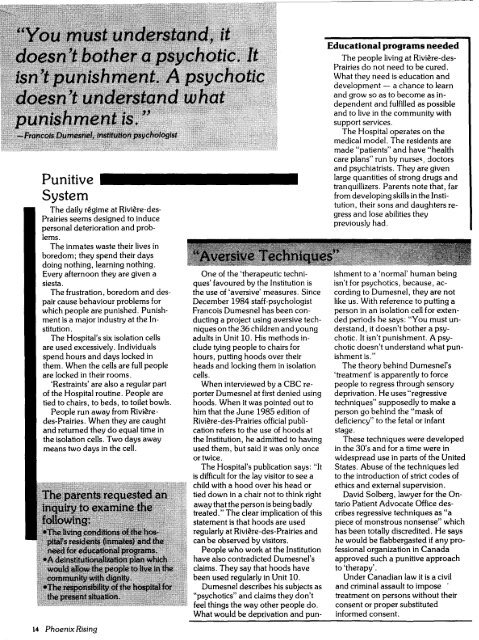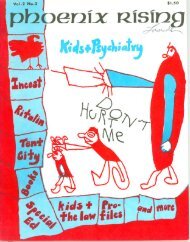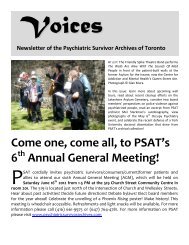Vol. 5, No. 4 - Psychiatric Survivor Archives of Toronto
Vol. 5, No. 4 - Psychiatric Survivor Archives of Toronto
Vol. 5, No. 4 - Psychiatric Survivor Archives of Toronto
Create successful ePaper yourself
Turn your PDF publications into a flip-book with our unique Google optimized e-Paper software.
Punitive<br />
System<br />
The daily regime at Riviere-des<br />
Prairies seems designed to induce<br />
personal deterioration and problems.<br />
The inmates waste their lives in<br />
boredom; they spend their days<br />
doing nothing, learning nothing.<br />
Every afternoon they are given a<br />
siesta.<br />
The frustration, boredom and despair<br />
cause behaviour problems for<br />
which people are punished. Punishment<br />
is a major industry at the Institution.<br />
The Hospital's six isolation cells<br />
are used excessively. Individuals<br />
spend hours and days locked in<br />
them. When the cells are fullpeople<br />
are locked in their rooms.<br />
'Restraints' are also a regular part<br />
<strong>of</strong> the Hospital routine. People are<br />
tied to chairs, to beds, to toilet bowls.<br />
People run away from Rivieredes-Prairies.<br />
When they are caught<br />
and returned they do equal time in<br />
the isolation cells. Two days away<br />
means two days in the cell.<br />
14 Phoenix Rising<br />
One <strong>of</strong> the 'therapeutic techniques'<br />
favoured by the Institution is<br />
the use <strong>of</strong> 'aversive' measures. Since<br />
December 1984 staff-psychologist<br />
Francois Dumesnel has been conducting<br />
a project using aversive techniques<br />
on the 36 children and young<br />
adults in Unit 10. His methods include<br />
tying people to chairs for<br />
hours, putting hoods over their<br />
heads and locking them in isolation<br />
cells.<br />
When interviewed by a CBC reporter<br />
Dumesnel at first denied using<br />
hoods. When it was pointed out to<br />
him that the June 1985 edition <strong>of</strong><br />
Riviere-des-Prairies <strong>of</strong>ficialpublication<br />
refers to the use <strong>of</strong> hoods at<br />
the Institution, he admitted to having<br />
used them, but said it was only once<br />
or twice.<br />
The Hospital's publication says: "It<br />
is difficultfor the lay visitor to see a<br />
child with a hood over his head or<br />
tied down in a chair not to think right<br />
away that the person isbeing badly<br />
treated." The clear implication <strong>of</strong> this<br />
statement is that hoods are used<br />
regularly at Riviere-des-Prairies and<br />
can be observed by visitors.<br />
People who work at the Institution<br />
have also contradicted Dumesnel's<br />
claims. They say that hoods have<br />
been used regularly in Unit 10.<br />
Dumesnel describes his subjects as<br />
"psychotics" and claims they don't<br />
feel things the way other people do.<br />
What would be deprivation and pun-<br />
Educational programs needed<br />
The people livingat Riviere-des<br />
Prairies do not need to be cured.<br />
What they need is education and<br />
development - a chance to learn<br />
and grow so as to become as independent<br />
and fulfilled as possible<br />
and to live in the community with<br />
support services.<br />
The Hospital operates on the<br />
medical model. The residents are<br />
made "patients" and have "health<br />
care plans" run by nurses, ~octors<br />
and psychiatrists. They are given<br />
large quantities <strong>of</strong> strong drugs and<br />
tranquillizers. Parents note that, far<br />
from developing skillsin the Institution,<br />
their sons and daughters regress<br />
and lose abilitiesthey<br />
previously had.<br />
ishment to a 'normal' human being<br />
isn't for psychotics, because, according<br />
to Dumesnel, they are not<br />
like us. With reference to putting a<br />
person in an isolation cell for extended<br />
periods he says: "You must understand,<br />
it doesn't bother a psychotic.<br />
It isn't punishment. A psychotic<br />
doesn't understand what punishment<br />
is."<br />
The theory behind Dumesnel's<br />
'treatment' is apparently to force<br />
people to regress through sensory<br />
deprivation. He uses "regressive<br />
techniques" supposedly to make a<br />
person go behind the "mask <strong>of</strong><br />
deficiency" to the fetal or infant<br />
stage.<br />
These techniques were developed<br />
in the 30's and for a time were in<br />
widespread use in parts <strong>of</strong> the United<br />
States. Abuse <strong>of</strong> the techniques led<br />
to the introduction <strong>of</strong> strict codes <strong>of</strong><br />
ethics and external supervision.<br />
David Solberg, lawyer for the Ontario<br />
Patient Advocate Office describes<br />
regressive techniques as "a<br />
piece <strong>of</strong> monstrous nonsense" which<br />
has been totally discredited. He says<br />
he would be flabbergasted if any pr<strong>of</strong>essional<br />
organization in Canada<br />
approved such a punitive approach<br />
to 'therapy' .<br />
Under Canadian law it is a civil<br />
and criminal assault to impose '<br />
treatment on persons without their<br />
consent or proper substituted<br />
informed consent.
















